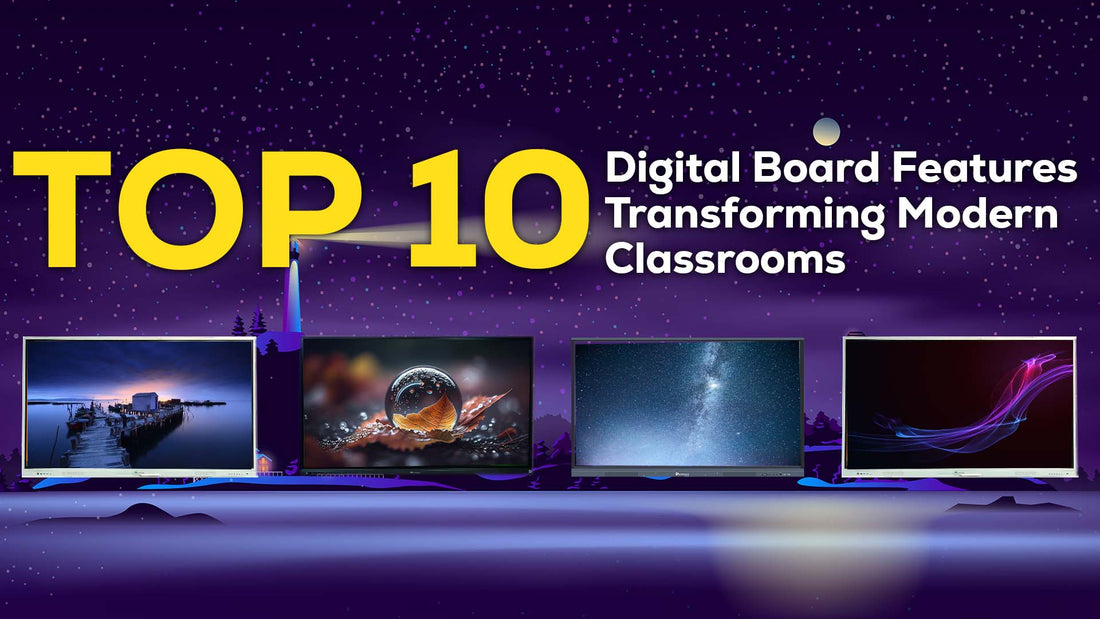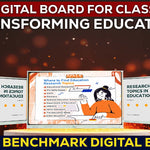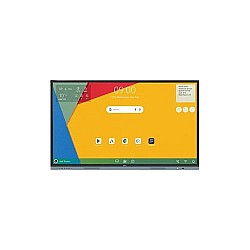
- Classroom Digital Board
- Classroom Solutions
- Classroom Tech
- Digital Board Features
- Digital Boards for
- Digital Education
- Digital Learning
- E-Learning Tools
- EdTech Innovation
- Educational Technology
- Interactive Boards
- Online Classroom Engagement
- Online Learning Tools
- Online Teaching
- Remote Education
- Smart Classroom
- Smart Education
- Teaching Online
- Teaching Tools
- Virtual Classroom
- Virtual Learning
Top 10 Digital Board Features Transforming Modern Classrooms and Workspaces
31 October 2024
The rise of digital boards has revolutionized the way people learn, teach, and collaborate. These smart, interactive tools are increasingly used in classrooms, corporate offices, and conference rooms to enhance presentations, engage participants, and simplify communication. With advanced digital board features becoming more accessible, organizations and educational institutions are now able to deliver more effective, interactive experiences.
This article will explore the top digital board features that make them indispensable in modern settings. From touch-enabled displays to cloud integration, these tools are bridging the gap between traditional methods and the demands of today’s tech-driven environments. Let's dive into the powerful features of digital boards and see how they are transforming classrooms and workplaces.
Also Read: 7 Reasons Why a Digital Board for Online Teaching is a Game-Changer
Essential Digital Board Features for Modern Classrooms and Offices
1. Interactive Touchscreen Technology
At the heart of every digital board is interactive touchscreen technology, which allows users to interact directly with the display. This feature makes lessons or presentations engaging by enabling teachers, students, or presenters to draw, annotate, and manipulate content with ease. Touch technology supports:
- Multi-touch capabilities (recognizing input from multiple fingers or users)
- Smooth handwriting and drawing
- Erasing and zooming with gestures
This feature mimics the natural experience of using traditional whiteboards while adding a layer of dynamic interaction.
2. High-Resolution Display
One of the most important digital board features is its high-resolution display. Whether for educational purposes or business meetings, crisp visuals are essential for effective communication. Modern digital boards come with 4K Ultra-HD or even 8K resolution, ensuring that text, images, and videos appear sharp and vibrant.
This clarity is crucial, especially in large classrooms or conference halls, where everyone needs to see the content clearly from different angles. The anti-glare coating on many digital boards further enhances visibility in bright environments.
3. Real-Time Collaboration Tools
With the shift towards hybrid learning and remote work, real-time collaboration has become a necessity. One of the most sought-after digital board features is the ability to collaborate seamlessly across locations. These boards allow participants to:
- Share screens and interact with content remotely
- Use cloud-based software for co-editing documents
- Annotate files in real-time during video conferences
This feature is especially useful for corporate meetings, where team members from multiple locations can brainstorm and present ideas together.
Also Read: Social Media Strategies for Studio Owners: Building an Online Presence

4. Built-in Software Solutions and Apps
Modern digital boards often come pre-installed with a suite of software and apps that enhance productivity. From note-taking tools to educational applications, these solutions streamline workflows. Many educational institutions benefit from content management platforms that allow teachers to upload, store, and share lesson materials directly on the board.
These built-in tools ensure seamless integration with Microsoft Office, Google Workspace, and other collaboration tools, allowing presenters to work efficiently.
5. Wireless Connectivity
Gone are the days of fumbling with cables. Wireless connectivity is one of the most appreciated digital board features, allowing users to connect their devices seamlessly. Digital boards often support:
- Wi-Fi and Bluetooth for device pairing
- Screen mirroring for presentations from smartphones, tablets, and laptops
- Integration with cloud platforms, enabling easy access to files
Wireless features minimize setup time and enhance productivity by making it easy to share content on the go.
6. Cloud Integration and Storage
Digital boards equipped with cloud storage solutions provide users with easy access to files and presentations. Cloud integration allows:
- Saving and sharing content directly to the cloud
- Collaborative editing of documents in real time
- Automatic backups, reducing the risk of data loss
This feature ensures that important information is always accessible, whether you're working remotely or switching between different locations.
7. Enhanced Audio Systems
Another valuable digital board feature is the inclusion of built-in audio systems. These boards often come with high-quality speakers and microphones, enabling participants to conduct virtual meetings and video conferences without the need for external devices. Advanced audio systems ensure:
- Clear sound for both in-person and remote attendees
- Noise-cancellation microphones to minimize background noise
- Seamless integration with video conferencing apps like Zoom and Microsoft Teams
With integrated audio features, digital boards simplify virtual communication for classrooms and workspaces.
Also Read: Building an Online Presence for Your Studio: A Comprehensive Guide
8. Compatibility with Video Conferencing Software
Incorporating video conferencing features is essential for modern digital boards, especially in remote work scenarios. With built-in compatibility for popular platforms like Zoom, Microsoft Teams, and Google Meet, these boards enable smooth virtual communication. Users can:
- Join meetings directly from the board
- Share content and annotate during discussions
- Record sessions for later review
This feature is essential for hybrid classrooms and distributed workforces, ensuring uninterrupted communication across teams and students.
9. Energy Efficiency and Eco-Friendly Design
Many digital boards are now designed with energy-efficient features, aligning with environmental goals. These boards consume minimal power during operation and automatically enter sleep mode when not in use, reducing energy consumption. Some models are made with recyclable materials to promote sustainable practices.
This focus on eco-friendly design reflects the growing trend of green technology and ensures that institutions and businesses meet their sustainability goals.
10. User-Friendly Interface and Customization Options
Ease of use is a significant consideration when choosing a digital board. Modern boards offer intuitive interfaces with easy navigation, ensuring that users of all skill levels can operate them without extensive training. Additionally, they offer customization options, such as:
- Changing display layouts
- Personalizing toolbar settings for faster access
- Creating custom templates for frequent tasks
This user-centric design ensures that both students and professionals can maximize the potential of digital boards with minimal effort.
Benefits of Digital Board Features for Education and Business
In Classrooms
- Increased student engagement through interactive learning
- Real-time feedback and assessments
- Access to digital content libraries for enriched lessons
In Workplaces
- Seamless presentations and brainstorming sessions
- Enhanced collaboration across geographically dispersed teams
- Improved decision-making processes with real-time data sharing
How Digital Board Features Promote Collaborative Learning
The interactive nature of digital boards fosters collaborative learning in classrooms and offices. Teachers can divide students into groups, allowing each group to contribute to shared projects on the board. Similarly, in corporate settings, digital boards enhance brainstorming sessions, enabling team members to visualize ideas collectively.
Frequently Asked Questions (FAQs)
What is a digital board, and how does it work?
A digital board is an interactive display that combines the functionality of a traditional whiteboard with advanced digital technology. It allows users to draw, annotate, and manipulate content directly on the board while also integrating with software tools and cloud platforms for enhanced productivity.
Why are digital boards beneficial in education?
Digital boards promote engaged learning by providing interactive content that enhances student participation. They support multimedia presentations, making complex subjects easier to understand. Additionally, digital boards offer tools for real-time assessments and collaboration, helping teachers create dynamic lessons.
What are the top digital board features for remote work?
For remote work, key digital board features include video conferencing integration, wireless connectivity, and cloud storage. These features enable seamless communication and file sharing across teams, whether working from home or in the office.
How do digital boards improve collaboration in offices?
Digital boards foster collaboration by allowing multiple users to interact with content simultaneously. They integrate with cloud services, making it easy to access and edit documents in real-time. This makes meetings more productive and encourages brainstorming across teams.
What is the difference between a digital board and a smart board?
While both digital boards and smart boards are interactive, digital boards often come with advanced features like high-resolution displays, built-in software, and better compatibility with modern collaboration tools. Digital boards are typically more versatile and user-friendly for both classrooms and workspaces.
Are digital boards energy efficient?
Yes, many modern digital boards are designed with energy-saving features. They automatically enter sleep mode when not in use and are made with eco-friendly materials, promoting sustainability.
Conclusion
The digital board features discussed in this article illustrate why these tools are essential for modern classrooms and workplaces. From interactive displays to seamless cloud integration, these boards enable engaged learning and productive meetings. As technology continues to evolve, digital boards will remain at the forefront of education and business innovation. Investing in a digital board today is a step towards smarter collaboration and effective communication for the future.
Prev post

Top 7 Benefits of Using a Digital Board for Online Teaching
Updated on 14 November 2024
Next post

Best Digital Board for Classroom: Transforming Education with Benchmark Digital Board
Updated on 30 October 2024
You Also Like
Benchmark Technomate Galaxy 14 (75”) Installation in Madhubani Bihar | Smart Classroom Setup by MD Kalam & MD Naushad
- 4k interactive flat panel for school
- 4k smart board for school
- 75 inch smart board for classroom
- benchmark technomate galaxy 14 75
- best interactive flat panel india
- bihar education technology
- classroom digital transformation
- digital board for training center
- digital classroom solution bihar
- digital teaching board bihar
- digital whiteboard for classroom
- education technology bihar
- galaxy 14 75 inch interactive panel
- hybrid classroom setup india
- interactive display for education
- interactive flat panel in madhubani
- interactive flat panel price india
- interactive panel 75 inch
- interactive panel for coaching institute
- interactive panel with android
- madhubani coaching digital setup
- madhubani smart classroom
- smart board installation madhubani
- smart class installation bihar
- smart classroom equipment india
- smart classroom setup in madhubani
- smart teaching solution madhubani
Benchmark Technomate Classic 14 Installation in Sitapur UP | Smart Classroom Setup by Suraj Kumar
- 75 inch smart board for classroom
- advanced classroom technology
- best interactive flat panel india
- classic 14 interactive flat panel
- classroom digital transformation up
- classroom presentation screen
- digital classroom solution uttar pradesh
- digital teaching board up
- digital whiteboard for classroom
- education digital solution india
- education technology uttar pradesh
- hybrid classroom setup india
- interactive board for college
- interactive display panel for education
- interactive flat panel dealer up
- interactive flat panel in sitapur
- interactive flat panel price india
- interactive panel for coaching institute
- interactive panel for school
- interactive panel for training center
- interactive panel with android
- interactive teaching solution sitapur
- online offline hybrid teaching setup
- professional smart classroom solution
- sitapur smart classroom
- smart board installation sitapur
- smart class installation up
- smart classroom equipment india
- smart classroom setup in sitapur
- smart education system india
- smart learning solution india
- smart teaching solution sitapur
- touch screen board for school
- uttar pradesh digital education
Benchmark Technomate Classic 14 (86”) Installation in Hisar Haryana | Interactive Flat Panel with Trolley for Lime Shades
- 86 inch digital board for showroom
- 86 inch interactive flat panel hisar
- 86 inch smart board for conference room
- 86 inch touch screen display
- advanced presentation technology india
- benchmark technomate 86 inch display
- benchmark technomate classic 14 86 inch
- benchmark technomate products india
- classic 14 86 inch interactive panel
- classic 14 trolley setup
- corporate digital solution haryana
- corporate meeting smart display
- digital presentation screen hisar
- digital whiteboard for conference room
- hisar digital infrastructure upgrade
- interactive board for training center
- interactive display for business presentation
- interactive flat panel dealer hisar
- interactive flat panel in haryana
- interactive flat panel price india
- interactive panel for corporate office haryana
- interactive panel with wifi support
- interactive screen with trolley stand
- large format interactive panel india
- large interactive board india
- professional interactive panel india
- smart board for large conference hall
- smart board installation hisar
- smart board supplier haryana
- smart classroom equipment haryana
- smart display installation hisar
Maxhub 75 Inch Interactive Display in Hisar Haryana | Digital Classroom & Conference Upgrade
- 4k smart board for school
- 75 inch smart board for classroom
- advanced teaching technology india
- best interactive flat panel india
- classroom digital transformation haryana
- digital board for classroom india
- digital classroom solution hisar
- digital whiteboard for classroom
- education technology haryana
- haryana education technology upgrade
- hisar coaching digital setup
- hisar smart classroom
- hybrid classroom setup india
- interactive board for corporate meeting
- interactive board for training center
- interactive display for education
- interactive flat panel in haryana
- interactive flat panel price india
- interactive panel for coaching institute haryana
- interactive panel with android
- maxhub 75 inch display india
- maxhub 75 inch interactive panel
- maxhub interactive board 75 inch
- maxhub interactive flat panel hisar
- smart board installation hisar
- smart class installation haryana
- smart classroom equipment india
- smart classroom setup in hisar
- smart teaching solution hisar
- touch screen board for school
Benchmark Technomate Sigma AI 75” Installation in Sonbhadra UP | Smart Classroom Setup by Santosh Kumar Yadav
- 4k smart board for school
- 75 inch 4k display for school
- 75 inch smart board for classroom
- advanced teaching technology india
- benchmark technomate sigma ai 75
- best interactive flat panel india
- best smart board for institute
- classroom digital transformation up
- classroom presentation screen 75 inch
- digital board for training center
- digital classroom solution uttar pradesh
- digital teaching board uttar pradesh
- digital whiteboard for classroom
- education digital solution up
- education technology uttar pradesh
- hybrid classroom setup india
- interactive board for college
- interactive display for education
- interactive display panel 75 inch
- interactive flat panel in sonbhadra
- interactive flat panel installation india
- interactive flat panel price india
- interactive flat panel supplier sonbhadra
- interactive panel for coaching institute up
- interactive panel with android
- interactive panel with wifi support
- interactive teaching tools for school
- modern classroom technology india
- online offline hybrid teaching setup
- professional smart classroom solution
- sigma ai 75 inch interactive panel
- sigma ai interactive panel up
- sigma ai panel dealer in up
- sigma ai series interactive panel
- smart board for large classroom
- smart board installation sonbhadra
- smart class installation up
- smart classroom equipment india
- smart classroom project uttar pradesh
- smart classroom setup in sonbhadra
- smart education system india
- smart learning solution uttar pradesh
- smart teaching solution sonbhadra
- sonbhadra coaching digital setup
- sonbhadra digital education setup
- sonbhadra smart classroom
- touch enabled smart board india
- touch screen board for school
- up school technology upgrade
- uttar pradesh education technology







